
The Poltava Oil Extraction Plant (POEZ) of the Kernel agricultural holding has officially switched to renewable energy sources certified by the international organization Bureau Veritas Group, the company’s press service reported on Facebook.
According to the report, the agricultural holding will fully supply POEZ with renewable energy from sunflower husks, thereby reducing its dependence on fossil fuels and cutting greenhouse gas emissions by more than 11,000 tons per year. In addition, autonomous power generation will ensure continuity of production and reduce risks to food security.
“This is another step towards transforming Ukraine into a sustainable, energy-independent, and innovative country that knows how to turn agricultural resources into strategic advantages. Now our consumers can make an informed choice and contribute to the green recovery of the country’s economy by supporting a producer of certified sustainable oil,” Kernel emphasized.
It is specified that POEZ became the first company in Ukraine’s food sector to join the Science Based Targets Initiative (SBTi). In addition, it intends to support communities and supply surplus “green” energy to Ukraine’s power grid.
“This step is part of Kernel’s efforts to decarbonize and ensure climate resilience at every stage of our work: from the field to logistics,” the agricultural holding summarized.
The Poltava OEZ of the Kernel agricultural holding specializes in the production of sunflower oil under the Stozhar trademark. Previously, oil under this brand was produced in Vovchansk (Kharkiv region). With the start of the full-scale invasion of Ukraine by the Russian Federation, the work of the SEZ in Vovchansk was suspended and its capacities were transferred to the Poltava region. Before the war, the processing capacity of the Vovchansk SEZ was 330,000 tons of sunflower seeds per year. In turn, the Poltava SEZ is designed to process up to 430,000 tons of sunflower seeds per year and produces unrefined, refined, and hydrated vegetable oil, as well as meal.
Before the war, the Kernel agricultural holding company ranked first in the world in the production of sunflower oil (about 7% of world production) and its export (about 12%). It is one of the largest producers and sellers of bottled oil in Ukraine. In addition, it is engaged in the cultivation and sale of agricultural products.
In the first nine months of 2025, Kernel increased its net profit by 7% to $218 million, with revenue growing by 19% to $3.092 billion and EBITDA increasing by 4% to $398 million.
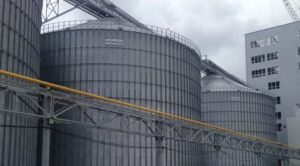
A pig breeding company in Lviv region has decided to build its own feed mill, according to KMZ Industries, which will supply elevator equipment for the plant.
According to the report, to ensure the storage capacity for the necessary raw materials and their further processing into compound feed, two cone silos with a total capacity of 1,020 tons for barley and wheat will be installed, one silo with a capacity of 143 tons for corn, and two silos with a capacity of 41 tons each for soybean and sunflower meal.
“Products from all silos will be fed in specific proportions to the feed line according to the recipe for further production of feed for pigs, chickens, etc. The capacity of the first line of the plant will be 2 tons/hour. In the future, it is planned to increase it to 10 tons/hour in order to produce feed not only for its own pig farm, but also for sale on the domestic market,” said Anton Goncharuk, regional representative of KMZ Industries.
For the transportation of agricultural products, a bucket elevator and three chain conveyors with a capacity of 50 tons/hour were selected, as well as five screw conveyors for feeding raw materials directly to the feed mill.
KMZ Industries is the largest manufacturer of elevator equipment in Ukraine and produces a full range of products, including silos, grain dryers, transport equipment, and separators, as well as providing automation and installation services.
According to the company, it has built more than 5,000 facilities. KMZ Industries silos with a total volume of more than 12.5 million cubic meters are currently in operation.
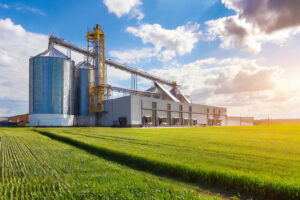
Two flour processing plants will be built in Ukraine in 2025 – flour will be produced in western Ukraine, and cereals in the Poltava region, according to an interview with Interfax-Ukraine by Rodion Rybchinsky, director of the Ukrainian Flour Millers Association.
“Currently, a plant for the production of hard wheat flour with a capacity of up to 150 tons per day is being built in western Ukraine, with further processing of pasta, and in the Poltava region, a cereal plant with a combined capacity of up to 100 tons per day is expected to be launched,” he said.
According to the head of the industry association, there are niches in the flour milling business that are worth paying attention to.
“When we talk about grain processing, we must remember that it is not just flour or cereals. There are also combined products: dry breakfasts, energy bars, starch, dry gluten, enzyme preparations based on grain processing products — a very wide range of processed products,” Rybchynsky emphasized, adding that the main priority in the construction of such a production facility is the availability of buyers.
According to him, the cost of building a mill or a cereal plant in Ukraine starts at $3 million, but there are examples of businesses in Ukraine with a higher price tag of $15 million. This amount includes the cost of equipment and buildings (fixed assets), excluding working capital, which can reach 50% of the project cost. After all, in order to launch an enterprise, it is necessary to purchase raw materials, actively enter the market, and anticipate marketing costs, etc.
Rybchinsky also does not rule out the prospect of building a number of flour mills on the Black Sea coast, following the example of Turkey.
“Uzbekistan and Egypt have followed the same path as the Turks. The Uzbeks buy Kazakh grain, grind it, and have become the main exporter of flour to Afghanistan, from where they have ousted Kazakhstan. Egypt buys Ukrainian and Russian grain and has become the leading supplier of flour to the African market, partially displacing both the Turks and the French. All this points to the existence of a state policy,” he stressed, adding that the first step towards such a development of processing in Ukraine should be the interest of the state.
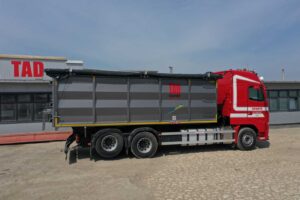
TAD has completed construction of a new complex for the production of special trailers for transporting oversized cargo in Volochysk (Khmelnytskyi region), which will enable it to double its production volumes, according to Dmytro Kysilevsky, deputy chairman of the parliamentary committee on economic development.
“The new production complex covers an area of 8,000 square meters and will create 250 additional jobs. The investment in the new production complex amounted to $8 million. This project will enable TAD to launch the production of a new type of product—modular special trailers,” he wrote on Facebook on Thursday.
He recalled that TAD specializes in the transportation of oversized cargo and the production of special trailers. TAD trailers have between two and 25 axles with a maximum load of up to 300 tons. The company employs 650 people.
“To attract new employees, TAD has agreed with the Volochysk city authorities to build a residential complex. In particular, the company is recruiting welders, CNC machine operators, and electricians to work at the new production complex,” Kysilevsky said.
He also noted that the company uses, in particular, loans under the “5-7-9” program, and its products are sold with a 15% compensation program for the cost of Ukrainian-made equipment. In addition, the company’s products are subject to localization requirements in public procurement (in 2025 – 25% – IF-U).
TAD (PP Trans-Auto-D), founded in 2006, is a leading manufacturer of special trailers in Ukraine and Eastern Europe, according to its website. It uses components from global manufacturers such as BPW, SAF, WABCO, TRIDEC, Pewag, and Rud.
According to the Clarity Project, in 2024, it increased its net profit by 42.7% compared to 2023, to UAH 51.1 million, with revenue growing by 25.4% to UAH 1.28 billion.
The company is co-owned by two local entrepreneurs, Vitaliy Melnyk (87.5%) and Andriy Babkin (12.5%).
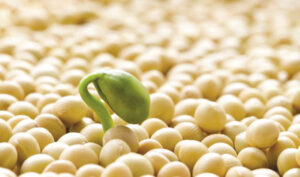
Agro-industrial holding Astarta, Ukraine’s largest sugar producer, and the International Finance Corporation (IFC) have signed a $40 million loan agreement to build Ukraine’s first soy protein concentrate plant, the agro-industrial holding’s press service said on Facebook.
Astarta noted that this investment is part of a financing package of up to $80 million approved by the IFC Board of Directors on April 1, 2025.
It is noted that the funds are secured by guarantees from the European Commission under the Ukraine Investment Framework and the Dutch government in support of the IFC Economic Resilience Action (ERA) program. The investment will contribute to job creation, increased competitiveness of the agricultural sector, and export diversification.
“This investment is an example of how strategic international partnerships transform challenges into long-term opportunities for Ukraine. By launching the country’s first soy protein concentrate production facility, we are integrating our country into global food chains, promoting economic recovery, industrial modernization, and job creation. Astarta is implementing this project as part of its sustainable agribusiness development strategy,” emphasized Viktor Ivanchik, CEO and founder of the agricultural holding company.
Alfonso Garcia Mora, IFC Vice President for Europe, Latin America, and the Caribbean, expressed confidence that this investment will help Ukraine produce more high-value agricultural products and move up the value chain.
“By improving the competitiveness of the agricultural sector and its integration into European markets, we aim to support recovery, job creation, and resilience,” he said.
According to European Union Ambassador to Ukraine Katarina Mathernova, whose words are also quoted in the press release, Astarta’s new plant is an example of how joint efforts bring real results for Ukraine’s future.
In turn, the Ambassador of the Kingdom of the Netherlands to Ukraine, Alle Dorgaut, noted that the Netherlands is pleased to contribute to the construction of Ukraine’s first soy protein concentrate plant.
“The IFC Economic Resilience Action (ERA) program provides support to critical sectors during the Russian invasion, including agribusiness (…) IFC’s investments in Ukraine are crucial, especially in the context of war, to ensure the vital recovery of the Ukrainian economy. In this context, international financial institutions, including the IFC as part of the World Bank Group, play a key role,” he stressed.
Astarta added that, in partnership with the Czech government, the IFC will also support the agricultural holding in conducting market and marketing research in Ukraine and provide advice on supporting local communities, youth, and older workers, facilitating the reintegration of veterans.
As reported, on April 1, the IFC approved a project to provide Astarta with an $80 million financing package for the construction of a soy protein concentrate plant in the Poltava region. The package will consist of: (i) a Loan A of up to $50.7 million from the IFC’s own resources, (ii) a loan of up to $24.4 million from the IFC, acting as the implementing agency for the Economic Resilience Program for Ukraine (ERA) with support from the Netherlands, and (iii) a Loan B of up to $40 million to be provided to the participants, provided that the total amount of the loans does not exceed $80 million.
In 2024, Astarta began investing in the construction of a soybean meal processing plant with a capacity of 500 tons/day (approximately 100,000 tons/year) at the Globinsky Industrial Complex (Poltava region). The agricultural holding will invest over EUR 76 million in the purchase of equipment and technologies and create 110 new jobs.
Astarta and its structural unit Astarta Agro Protein signed the first investment agreement with the Ukrainian government to receive compensation from the state for significant investments. Under the agreement, the state will provide the agricultural holding with a number of incentives, including exemption from import duties on new equipment, import VAT on new equipment, and income tax for up to five years.
Astarta is a vertically integrated agro-industrial holding company operating in eight regions of Ukraine and the largest sugar producer in Ukraine. It comprises six sugar factories, agricultural enterprises with a land bank of 220,000 hectares, dairy farms with 22,000 head of cattle, an oil extraction plant in Hlobine (Poltava region), seven elevators, and a biogas complex.
In the first nine months of 2024, Astarta increased its net profit by 35.1% compared to the same period in 2023, to EUR75.60 million. The agricultural holding’s revenue grew by 12.6% to EUR441.46 million, and EBITDA by 12.8% to $131.56 million.
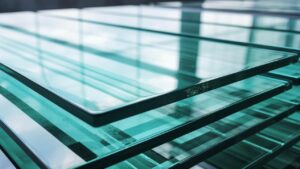
The Ukrainian company City One Development and the diversified investment corporation ITOXI Corp. (South Korea) have signed a memorandum of long-term cooperation, a partnership of a strategic nature aimed at developing glass production in Ukraine, the press service of City One Development toldInterfax-Ukraine.
“We are pleased that our efforts to attract a foreign partner from a friendly country have resulted in a real deal. This is only the first step on the long road to implementing our joint plans, and we are confident that our partnership will make an important contribution to the development of the Ukrainian economy,” said Valeriy Kodetsky, President of City One Development Group, as quoted in the press release.
It is specified that the memorandum, signed in April 2025 during the visit of the Korean delegation to Ukraine, stipulates that at the first stage of the project, two glass production plants will be built within the City of Glass (Berezan, Kyiv region) and Galicia (Kalush, Ivano-Frankivsk region) industrial parks. This project will be an important milestone for the introduction of modern technologies, creation of new jobs and strengthening Ukraine’s position as a high-quality glass producer.
“We are confident that our joint work will open up new horizons for investment and technological progress. Ukraine has great potential and we are proud to be part of this ambitious initiative. The signed memorandum is an important milestone that confirms our intention to invest in the development of the country’s glass industry. We are currently finalizing an agreement to acquire a stake in the project,” said Alex Cheon, CEO of ITOXI Corp.
City One Development started construction of the first float glass plant in Berezan at the beginning of the full-scale invasion in 2022. The plant’s capacity is to produce 600 tons of glass per day, and the project is estimated at $140 million. It is being implemented as part of the Misto Skla IP. At the end of 2024, the company began construction of a second plant within the Galicia IP.
The first plant is expected to be commissioned in 2027 and the second in 2028.
City One Development is an investment and development company with over 15 years of experience. The company specializes in the creation, implementation and management of large-scale infrastructure residential complexes and actively invests in the development of Ukrainian industry.
City One Development’s portfolio includes more than 1 million 150 thousand square meters of completed projects and 600 thousand square meters under construction.
The company’s residential projects in the capital include: “Novopecherski Lypky, Boulevard of Fountains, Svyatobor Park Resort, and The Light. Among the industrial projects are two float glass factories within the City of Glass and Galicia.
ITOXI Corp is a leading investment company operating in various segments, from computer games to medical equipment and the implementation of large infrastructure projects in the international arena. In November 2023, ITOXI UA was founded with an authorized capital of UAH 8.7 million. The founders are ITOXI Corp (51%) and Roman Hryhoryshyn (49%).
According to the website, ITOXI UA is a platform for commercial B2B cooperation that connects Ukrainian companies with Korean partners. Currently, it unites 214 partners in Ukraine and 62 in the Republic of Korea, with more than 17 projects in the works.